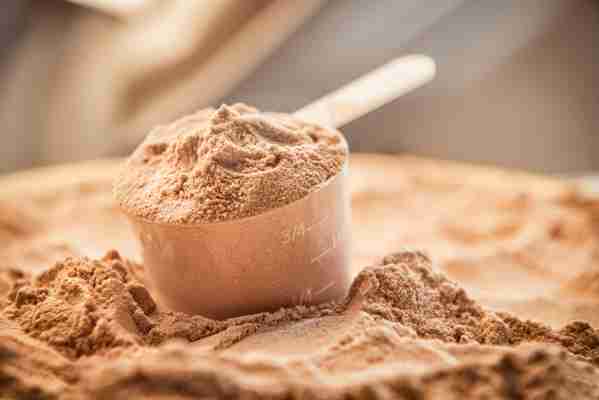Should you use protein powders? It’s complicated.
Did you think protein powder and protein shakes were the domain only of the Arnold Schwarzeneggers and Dwayne “the Rock” Johnsons of the world?

These days, protein shakes and powders are used by diverse groups of people that couldn’t be more different, at least physically: elite athletes, post-surgery patients, the elderly, time-deprived Type A’s and fast-growing teens.
Why? Because protein in and of itself is key in healing and restoring the body (not just muscle, but also bone, cartilage and blood) — whether the breakdown is from high workout loads or from medical procedures, such as surgery or radiation. But that doesn’t mean we should all run out and buy tubs of powder. As with any food or supplement, there are upsides and downsides, and it pays to educate yourself.
Pro: Powders can be quicker and easier than food
Why are the elderly getting into protein shakes and powders? “Older Americans — they’re a population group that is losing muscle and yet they often don’t have much of an appetite,” says Carole Havrila, a dietitian and certified oncology specialist at the University of Virginia Health System. “It’s easier for them to drink their calories and protein.”
Other groups that can benefit from protein powders include rapidly growing and busy teens (they can grab a shake and go — better than a candy bar) and athletes.
“Building muscle takes planning. Ideally you eat every three hours, and the timing is particularly important right after a workout,” Havrila says. This is where the appeal of powders comes in.
Athletes can’t fit in a home-cooked, sit-down meal five or six times a day, says Elizabeth Brooks, a D.C. personal trainer.
“You see people walking around the gym with their protein shakes,” says Brooks, a former body builder. “It’s their way of getting protein within 30 minutes of working out.”
Con: They’re lacking in nutritional balance
"Is it better to get your nutrition from whole foods? Absolutely," says Rebecca Mohning, a dietitian in the Washington area and owner of Whole foods often include fiber, which helps regulate the digestive system, and vitamins, which help boost the immune system, and real foods generally are more balanced — they have a little bit of everything. (A cup of brown rice, for example, has fiber, protein, potassium and vitamins.)
“Whole foods are not hyper focused on one nutrient like protein powders are,” Mohning says.
Another downside with protein shakes is that because they are liquid they might not feel filling initially and could cause some people to consume too many calories. And too much protein itself can cause harm to the kidneys (protein is processed through the kidneys; Mohning suggests drinking more water when you up your protein in general to improve kidney health).
Pro: They provide non-meat options for protein
Vegetarians and vegans can have a hard time getting their daily quota of protein through regular food, and protein powders provide options. “Whey is the gold standard. It’s a complete protein,” Mohning says, meaning it contains all nine essential amino acids.
And how about the vegans out there? (Whey is derived from milk.) Soy used to be considered the best alternative but has fallen out of favor with many people because of possible side effects (drug interactions, high blood pressure, hormone changes). Instead Mohning suggests hemp, rice and pea protein for vegans. If possible, try a combination of several plant-based powders to include as many amino acids as possible.
Havrila adds that before committing to any one type or brand of big — often expensive — container, try a small packet-size portion of a specific protein powder to see whether the flavor and texture is agreeable. Whole Foods, for example, sells small packets.
“Recommending a protein powder is like recommending shoes,” Brooks says. “You have to go try them on and see what you like.”
[Get ready for pea milk. It doesn’t taste like peas and it’s not even green.]
Con: Questionable quality
Dietary supplements are classified differently than food, and the Food and Drug Administration does not do independent reviews of supplements before they hit the market. (It does have the authority to pull those products off the shelves if they are found to be unsafe or make false claims.) “They can have additives you don’t need,” Havrila says, “and huge amounts of vitamins, which I would worry about.”
Too many vitamins can lead to nausea, hair loss and nerve damage.
Not only that, but Havrila says she knows of cases where heavy metals, caffeine and even steroids have been found in powders. And less alarming but still noteworthy: High levels of sugar or sugar alcohols, which can cause gas, are often found in powders.
But there are plenty of good brands out there, and if whole foods are not an option, Havrila and Mohning suggest looking for protein powder brands that have been tested by third-party organizations, such as Consumer Lab and NSF International.
The final scoop
So what's the takeaway? Do you need protein powders? If your daily allowance of protein — the government recommends about 50 grams a day — is met through whole foods, then probably not. (Mohning actually recommends .55 grams of protein per pound for the elderly, about 80 grams for an elderly person who weighs 150 pounds, and as much as .85 grams of protein per pound for strength- and power-based athletes, which would translate into 170 grams of protein for a strength-building athlete who weighs 200 pounds.)
But still, the need to spread the protein intake evenly throughout the day can be an argument for a morning protein shake (15 to 20 grams of protein to start the day). A cup of coffee and a toast is about 3 to 5 grams of protein.
“This is such a grab-and-go culture,” Havrila says. “Protein powders are an example of that — they’re quick and easy.”
Boston is a fitness trainer and freelance writer. She can be found at

